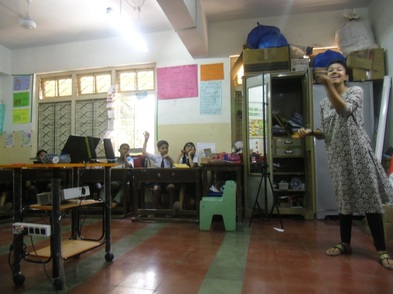 Hyperbole or false analogy – perhaps, but let this rest as an introduction to a fantastic school and some great school leadership. To try to capture all of the impressive elements of learning I witnessed at the school would be a tall order – but the video below imperfectly highlights some of them. It shows a short chunk of a longer discussion, initiated by Shriti (Grade III)’s question: in early river civilisations, how and why did the first markets spring up?Among the notable points, to me, were the teacher’s response – to take up the question, invite student response and then tell Shriti – who was disappointed with the lack of focus of the responses on her questions: ‘Ask, ask, it’s your class!’ It’s also worth pointing out the high level of conversational English being employed in the discussion.
Hyperbole or false analogy – perhaps, but let this rest as an introduction to a fantastic school and some great school leadership. To try to capture all of the impressive elements of learning I witnessed at the school would be a tall order – but the video below imperfectly highlights some of them. It shows a short chunk of a longer discussion, initiated by Shriti (Grade III)’s question: in early river civilisations, how and why did the first markets spring up?Among the notable points, to me, were the teacher’s response – to take up the question, invite student response and then tell Shriti – who was disappointed with the lack of focus of the responses on her questions: ‘Ask, ask, it’s your class!’ It’s also worth pointing out the high level of conversational English being employed in the discussion.
In all four of the lessons I saw, students were engaged and challenged in their thinking – the demand for independence of though and learning was clearly articulated – and students were expected to work with partners, which they successfully did. The conceptual links between different activities were clear and were well articulated. Less tangibly there was a happy and productive air about the school – students enjoyed coming there, they said, because they learned new things.
DN Nagar School is an attractive building – which Rahul described as being one of the very best in Mumbai. The building is occupied by a dozen different schools, teaching in a variety of languages, not to mention a small crowd registering for some form of government ID card in the corner of the hall. Within this space, Rahul and his team preside over three classrooms and a school hall with a stage. As in most Mumbai schools, owing to shortage of buildings, the school operates a split-shift system – with Junior KG and KG attending in the morning and Grades I-III in the afternoon. The school will grow through to Xth Grade, taking over empty classrooms in the building caused by falling enrolment in the non-English-medium schools there. The school is run by the Akansha Foundation, which takes over government schools and runs them with a programme modelled on KIPP. Students pay nothing for attendance at the school.
This in turn developed from a highly developed and coherent vision on Rahul’s part. He described the two pillars of the school as being joy and rigour – neither one of which is enough in isolation. He also explained how much he trusts his teachers and works to develop and support them – mostly in a non-directive way and focussing more on developing teachers as individuals, rather than as teachers. His success is perhaps evident from the week before I visited, when he had been away all week ‘I didn’t receive a single phone call’, he said.The school’s performance metrics are good – but Rahul said he was worrying less and less about that – and focussing on values. He was also unconcerned about the school’s ‘shortcomings’ in those metrics – saying that the school knows where the gaps are in students’ learning, and knows how they will fill them. It was obvious that the school’s culture was one of continual improvement and change towards this, as he unfolded the series of changes they had made in initiating self-study time, in response to a need they had noted to develop student skill in working individually.
DN Nagar is not yet perfect. Students’ independent learning needs to develop – a school priority – and more AfL and plenaries would help check how well this will be achieved. However, the clear desire to improve on the part of teachers and head teacher suggests that these things will be achieved in time – and that, by the time these students reach Xth Grade, we can expect spectacular results from them.After only two years as a head, Rahul is going on to face new challenges at a school three times larger in Pune – but he is confident that the school will be fine without him. He explicitly answered one of my favourite leadership questions upfront: ‘If I walked under a bus I am quite sure the school would continue fine without me’ – a statement achieved through the trust Rahul has shown to his teachers and the work he has done to offer them leadership of the school. It is testament to his leadership that – despite his leaving the school, it’s future can seem so assured.


